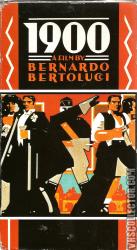1900
Catalog Number
8804
-
Primary Distributor (If not listed, select "OTHER")
Catalog Number
8804
Primary Distributor (If not listed, select "OTHER")
Release Year
Country
N/A (NTSC)
N/A | N/A | N/A
N/A | N/A
Novecento (1977)
Additional Information
Additional Information
Born the same day in 27 January 1901, Alfredo Berlinghieri and Olmo Dalcò come from opposite ends of the social spectrum. Alfredo is from a family of landowners led by his abusive but populist grandfather (also called Alfredo), while Olmo is an illegitimate peasant. Olmo's grandfather, Leo, is the foreman and peasants' strong man who verbally and spiritually carries out a duel of wits with grandfather Alfredo. As Alfredo is somewhat rebellious and despises the falseness of his family, in particular his weak but cynical father Giovanni, he befriends Olmo, who was raised as a socialist.
The two are friends throughout their childhood, despite the social differences of their families. Olmo enlists with the Italian army in 1917 during World War I and goes off to fight while Alfredo learns how to run his family's large plantation under the guidance of his father. Olmo returns from the war over a year later and his friendship with Alfredo continues. However, Alfredo's father has hired Attila Mellanchini as his foreman. A sadistic man who becomes taken with fascism, Attila eventually incorporates his new belief system in his dealings with the Berlinghieri workers; he treats them cruelly and later cages them in the Berlinghieri compound and accuses them of treason against fascist Italy. Several are killed by Attila himself. As the new padrone (master) of the plantation, Alfredo does little to challenge or halt Attila's actions.
During the late 1920s, the intimacy and lack thereof in their respective relationships with others is highlighted in their love lives. Alfredo marries a gorgeous, demure woman while Olmo marries Anita, who like him shares in the enthusiasm of the cause of workers' rights. Alfredo’s wife, Ada, sinks into alcoholism when confronted with the reality of the emptiness of her relationship with Alfredo. Anita, a strong and independent spirit dies tragically in childbirth, bringing another member into the community. As Olmo takes on his fateful role of leader among the poor farmers and their families, he clashes with Attila.
The power, however, shifts after World War II in 1945, and the ruling class is at the mercy of the jovial and bitter peasants in the agricultural estate. As padrone, Alfredo is captured by a teenage peasant boy carrying a rifle. Attila is also captured when he and his wife, the equally cruel and sadistic Regina, try to flee the region. Attila is stabbed, non-fatally, several times by women wielding pitchforks and is imprisoned in the Berlinghieri pig sty. He is later executed by the peasants (while they cut off most of Regina's hair), who have discovered that Attila had raped and killed a young boy (ironically, the son of one of the most fervent supporters of fascism as an antidote to socialism) several years prior in a sadistic sexual frenzy and had also murdered a wealthy landowner's widow, Mrs. Pioppi (whose husband had been economically ruined by Alfredo), in order to steal her land and home, also [years earlier] Attila had several peasants massacred after they threw horse manure at Atilla for "selling" Olmo. Olmo made Atilla eat manure and let him go. Olmo then had to leave town to keep from being killed by the fascists. Alfredo fires Attila, when Attila and his blackshirts seek vengeance on Olmo by tearing up Olmo's house.
Alfredo is brought before Olmo's workers tribunal to stand trial. Many workers come forth and accuse Alfredo of letting them suffer in squalor while he (and his social class) profited from their labors. Alfredo is sentenced to death, but his execution is prevented after Olmo explains that the padrone is dead, so Alfredo Berlinghieri is alive. Suggesting that the social system has been overthrown with the end of the war. As soon as the verdict is reached, however, representatives of the new government, which includes the Communist Party, arrive and call on the peasants to turn in their arms. Olmo convinces the peasants to do so, overcoming their skepticism. Alfredo declares, "The padrone lives."
Bernardo Bertolucci's 255-minute 1900 was a gargantuan undertaking, requiring the resources of three European countries and a trio of American movie studios. Set in the Italian town of Parma, the film's continuity backtracks from Liberation Day in 1945 to the occasion of composer/patriot Giuseppe Verdi's death in 1901. We follow the lives of two men born on that day in 1901, who grow up to be Alfredo Berlinghieti (Robert De Niro) and Olmo Dalco (Gérard Depardieu). Wealthy Alfredo sinks into dissipation, while poverty-stricken Olmo becomes a firebrand labor leader and communist. After WWI, Alfredo is allowed to peacefully retain his land holdings by playing nice with the burgeoning fascists; Olmo, on the other hand, engages in a long-standing battle against the minions of Mussolini. The two protagonists are reunited when Alfredo returns to Parma to preside over Olmo's trial for "political crimes." Co-star Burt Lancaster is cast as Alfredo's wealthy grandfather, who hates to see the old values buried beneath the social travails of the 20th century. Many American prints of 1900 were shortened to 243 minutes, rendering the story hard to follow at times.
The two are friends throughout their childhood, despite the social differences of their families. Olmo enlists with the Italian army in 1917 during World War I and goes off to fight while Alfredo learns how to run his family's large plantation under the guidance of his father. Olmo returns from the war over a year later and his friendship with Alfredo continues. However, Alfredo's father has hired Attila Mellanchini as his foreman. A sadistic man who becomes taken with fascism, Attila eventually incorporates his new belief system in his dealings with the Berlinghieri workers; he treats them cruelly and later cages them in the Berlinghieri compound and accuses them of treason against fascist Italy. Several are killed by Attila himself. As the new padrone (master) of the plantation, Alfredo does little to challenge or halt Attila's actions.
During the late 1920s, the intimacy and lack thereof in their respective relationships with others is highlighted in their love lives. Alfredo marries a gorgeous, demure woman while Olmo marries Anita, who like him shares in the enthusiasm of the cause of workers' rights. Alfredo’s wife, Ada, sinks into alcoholism when confronted with the reality of the emptiness of her relationship with Alfredo. Anita, a strong and independent spirit dies tragically in childbirth, bringing another member into the community. As Olmo takes on his fateful role of leader among the poor farmers and their families, he clashes with Attila.
The power, however, shifts after World War II in 1945, and the ruling class is at the mercy of the jovial and bitter peasants in the agricultural estate. As padrone, Alfredo is captured by a teenage peasant boy carrying a rifle. Attila is also captured when he and his wife, the equally cruel and sadistic Regina, try to flee the region. Attila is stabbed, non-fatally, several times by women wielding pitchforks and is imprisoned in the Berlinghieri pig sty. He is later executed by the peasants (while they cut off most of Regina's hair), who have discovered that Attila had raped and killed a young boy (ironically, the son of one of the most fervent supporters of fascism as an antidote to socialism) several years prior in a sadistic sexual frenzy and had also murdered a wealthy landowner's widow, Mrs. Pioppi (whose husband had been economically ruined by Alfredo), in order to steal her land and home, also [years earlier] Attila had several peasants massacred after they threw horse manure at Atilla for "selling" Olmo. Olmo made Atilla eat manure and let him go. Olmo then had to leave town to keep from being killed by the fascists. Alfredo fires Attila, when Attila and his blackshirts seek vengeance on Olmo by tearing up Olmo's house.
Alfredo is brought before Olmo's workers tribunal to stand trial. Many workers come forth and accuse Alfredo of letting them suffer in squalor while he (and his social class) profited from their labors. Alfredo is sentenced to death, but his execution is prevented after Olmo explains that the padrone is dead, so Alfredo Berlinghieri is alive. Suggesting that the social system has been overthrown with the end of the war. As soon as the verdict is reached, however, representatives of the new government, which includes the Communist Party, arrive and call on the peasants to turn in their arms. Olmo convinces the peasants to do so, overcoming their skepticism. Alfredo declares, "The padrone lives."
Bernardo Bertolucci's 255-minute 1900 was a gargantuan undertaking, requiring the resources of three European countries and a trio of American movie studios. Set in the Italian town of Parma, the film's continuity backtracks from Liberation Day in 1945 to the occasion of composer/patriot Giuseppe Verdi's death in 1901. We follow the lives of two men born on that day in 1901, who grow up to be Alfredo Berlinghieti (Robert De Niro) and Olmo Dalco (Gérard Depardieu). Wealthy Alfredo sinks into dissipation, while poverty-stricken Olmo becomes a firebrand labor leader and communist. After WWI, Alfredo is allowed to peacefully retain his land holdings by playing nice with the burgeoning fascists; Olmo, on the other hand, engages in a long-standing battle against the minions of Mussolini. The two protagonists are reunited when Alfredo returns to Parma to preside over Olmo's trial for "political crimes." Co-star Burt Lancaster is cast as Alfredo's wealthy grandfather, who hates to see the old values buried beneath the social travails of the 20th century. Many American prints of 1900 were shortened to 243 minutes, rendering the story hard to follow at times.
Related Releases1
Catalog Number
8804
Primary Distributor (If not listed, select "OTHER")
Novecento (1977)
Release Year
Catalog Number
8804
Primary Distributor (If not listed, select "OTHER")
Catalog Number
8804











Comments0
Login / Register to post comments